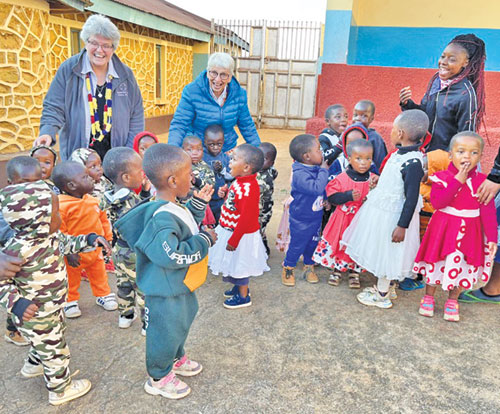2024 Vocations Awareness Supplement
Benedictine sisters bring hospitality to local, international communities

During a recent visit in September, Benedictine Sister Mary Luke Jones (second from left) and Community of International Benedictines moderator Benedictine Sister Lynn McKenzie (far left) share joy and playfulness with orphan children in Tanzania. (Submitted photo)
By Ann Margaret Lewis
The Benedictines are one of the oldest religious orders in the Church. Communities of Benedictine monks, nuns and sisters have been guided for some 1,500 years by St. Benedict’s Rule, which lays out how his spiritual sons and daughters seek holiness together.
One of the key precepts of the Rule is hospitality, or welcoming the other as one would welcome Christ.
The Benedictine Sisters of Our Lady of Grace Monastery in Beech Grove have a special focus on hospitality, both locally in their special liturgies, which are open to the community, and internationally through acts of loving service.
Benedictine Sister Marie Therese Racine has been a professed religious for 21 years. As Our Lady of Grace Monastery’s director of liturgy, she manages preparations for the regular liturgies of the community. They include Masses in their chapel as well as the Liturgy of the Hours, which the community prays together three times a day.
These liturgies offer many opportunities for hospitality, Sister Marie Therese said. And yet, as she became part of the community, she found that charism particularly difficult to practice.
“I’m more of a shy person,” she said. “But it’s a development of a disposition of heart or an attitude of the heart to always be ready to welcome someone as Christ.”
She adds that St. Benedict wrote that no monasteries should be without guests.
“All guests who present themselves are to be welcomed as Christ,” she said. “So … we show proper honor to them and meet with them with all the courtesy of love.”
Sister Marie Therese keeps visitors in mind while prepping for the community’s liturgies. This includes ensuring there are lectors and servers for the liturgies as well as enough supplies, and that the chapel is accessible for those with disabilities and using mobility devices.
She also directs the schola and handbell choirs and prepares worship aids so that visitors can sing along. Worship aids are especially important for the Liturgy of the Hours, the regular prayer of the Church with which many visitors might be unfamiliar.
“Historically, [the Liturgy of the Hours] was the people’s prayer before it got really involved in monasteries,” said Sister Marie Therese. “So, because it’s always been the prayer of the people, we really want to have people here with us praying.”
Members of the outside community, even people of other faith traditions, are always welcome at any of the liturgies, the times of which are listed on the sisters’ website.
Sister Marie Therese said it is her hope, and the hope of all her sisters, that “[guests] feel welcome and comfortable and prepared to pray with us. [That they are] able to have their hearts open to encounter Christ during that liturgy. [And that] when they come, they can find peace, some healing, if that’s what they need, as well as some joy.”
The Benedictine charism of hospitality, however, doesn’t stop with their local community. Benedictine Sister Mary Luke Jones, a professed member of Our Lady of Grace Monastery for 56 years, is executive secretary to the moderator of Communio Interantionalis Benedictinarum or the Community of International Benedictines (CIB), which is committed to sharing the Rule of St. Benedict with all cultures and countries.
In that role, Sister Mary Luke has traveled extensively.
“Benedictines are the same all over the world,” she said. “I have had the privilege of visiting sisters in a number of countries and meeting with sisters from every continent, and they are all the same in regard to their commitment to hospitality. Similarly, people all over the world … want to be respected and treated as children of God.”
She noted that Benedictine communities in Tanzania, Ukraine and Australia, as well as those in the United States, work together to promote the charism of hospitality and treating others with dignity and respect.
“The role of CIB,” Sister Mary Luke explained, “is to strengthen the bonds of Benedictine women worldwide, to acknowledge their work, to support their efforts on behalf of the people they serve and to unite our prayers for the world. In so doing, sisters are fortified in their mission of prayer, work and hospitality.”
At the same time, she said, “the recipients of their hospitality gain a sense of worth and dignity. Benedictine women extend themselves in service to men and women, children of all ages through education, health care, spiritual direction, prayer.”
She added, “Never counting the cost, the sisters go out of their way to meet and greet, serve and pray for the people of God—the ones before them and others from all over the world.”
An example of this, Sister Mary Luke said, comes from the sisters in Ukraine, who are dealing with the daily struggles of war in their country. The Abbess Klara Swiderska of Zhytomyr, Ukraine, wrote to the CIB community, relating how their sisters had to adapt to regular shellings, gunfire and deaths that are close to their home. The abbess wrote: “We have learned that the only thing we can do and change in the world is our little heart.”
By changing themselves and focusing on Christ in the other, Sister Mary Luke and Sister Marie Therese reach out and assist to the wider community in any way they can.
(To join the Benedictine sisters at their Beech Grove monastery for their regular liturgies, see their prayer schedule on their website, benedictine.com/prayer-schedule. For more information on CIB and their hospitality outreach worldwide, go to benedictines-cib.org.) †
